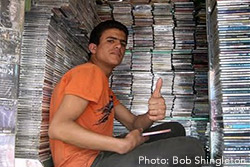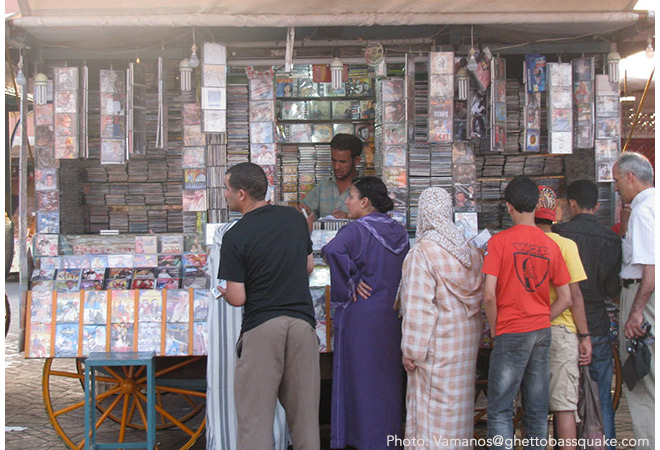Europe's online source of news, data & analysis for professionals involved in packaged media and new delivery technologies

Launching legitimate DVDs in Morocco - a personal experience
The market for optical media in Morocco is estimated at between 30 and 40 million discs annually, retailing at approximately $1.50 each. That did not deter ANTHONY OWEN, a DVD veteran with more than ten years experience in North Africa, to try to establish a legitimate DVD distribution business in the country. Here is, in exclusivity, his eventful journey.
In recent times, DVD prices have even fallen to as low as $2.50 for five discs, not a hard selection to make when the average retailer has between 500 and a thousand films on his stall. Once watched, discs could be 'part exchanged' in a primitive rental system giving an even lower retail price. Discs which don't play (or stop playing half way through the film) were exchanged 'no questions asked.'
With a market as price-sensitive as Morocco it was important to discover at the outset what price the consumer was willing to pay for legitimate discs. A number of secondary schools across the country, and many pirates themselves, agreed to hand out questionnaires and though the number sampled was small - in the region of two to three thousand - it became clear that consumers were more than happy to pay up to five dollars for legitimate product which was localised with French subtitles and guaranteed to play all the way through (not always the case with pirate discs). The better quality and extras available on dual-layer discs was also appreciated and gave an additional selling point as all pirated products are re-compressed to fit on single-layer discs, with any extras dropped.
So, we knew the details of the market and the price points acceptable. The major western film studios, both American and European, proved more than cooperative when we approached them, and a period of intense negotiation followed over prices and conditions. The project was on track. It did not appear it would be easy, but then if it was easy everyone would do it!
Deciding that releases of local films would be the best way to launch legitimate product in the territory, negotiations were entered into with local content holders. At first these were not easy, many properties which were currently sitting in cupboards earning no return were suddenly given a value of thousands of dollars when their owners sniffed a revenue opportunity. Finally arrangements were made with two local content holders to author their latest releases and the masters were supplied. However no sooner were the disks authored than pirate disks appeared - in prime position - in the pirate shops throughout the Kingdom, one apparently from the legitimate release in France, the other from who knows where, though we suspected a copy had been stolen from post production. Though it was not welcome we could understand why the content holders decided not to honour their agreements with us.

With the signing of the new film laws in 2010 a government grant became available for legal distributors. Though this would be small - a matter of pence given on a disc sold basis - it was further help for a very finely balanced financial plan. The legal rate of 7% VAT on cultural items, though an additional expense, was not onerous. The various ministers involved seemed enthusiastic about finally making home video a legitimate business, also recognising the advantages for the domestic film industry. All was going well until the Ministry of Finance informed us that, despite the law's requirements, no subsidy would be paid under any circumstances and also that they would not classify DVDs as cultural items and the 'usual' full rate of VAT at 20% would be demanded. Our financial plan was beginning to look more and more unfeasible, but we continued.
After a prolonged period of hard negotiation, terms were arranged for the import of discs with French subtitles suitable for the local market, brought in on spindle for local packaging. However the supply of discs at an economic price was only one part. The cost of transporting them from the replicators in Europe to Morocco was several times the cost of the discs themselves! Though transport costs as far as the south of Spain were reasonable, they quadrupled when the 25 miles across the straits to Africa were taken into account. Another hindrance, until we managed to arrange with a French transport company who ran regular Paris to Casablanca services that they would transport several thousand discs per month at a more realistic price providing we would accept very flexible delivery times - with anything up to six weeks' delay per shipment.
Local printing of covers in French and Arabic were arranged and supplies of standard DVD cases and holographic security stickers were sourced from Chinese suppliers, a registration for local bar codes was made and finally, after over a year, we looked set to go.
The final hurdle was to arrange for local distribution. The vast majority of pirate stalls declared that they would be only too willing to switch their offerings to legitimate discs. By leaving the shadow economy and entering the mainstream one they would not only avoid police action - and the bribes that were necessary to continue in business - but also be able to set up their own registered business and, with their families, become eligible for the insurance and health services offered by the state. Our wholesale prices also ensured that they should be able to increase their income slightly, despite our projections that they would sell slightly lower volumes.

Domestic supermarket chains - one owned by the King - were approached and declared themselves willing to carry the product. Providing, of course, we were willing to pay for shelf space - they have learned well from their European and American counterparts! However, a further complication arose in that they were already carrying a number of DVDs at very low prices - mainly children's films from the best known cartoon studios in the US. An inspection of the packaging and disc printing revealed that they were also counterfeit offerings, probably sourced from Asia or Eastern Europe, but as far as the supermarket buyers were concerned they were 'legitimate product' - they had the customs certificates to prove it - and it was clear that only direct action by the studios involved would persuade them otherwise.
A small number of international home entertainment chains had also opened a couple of branches as franchise operations in shopping centres in the major towns. Carrying DVDs at full European prices, they admitted that selling "two or three discs" was a "good day" for them, and they were enthusiastic about sourcing locally at more realistic prices for the country. Unfortunately, with this low turnover, along with the financial problems of their parent companies, these shops did not last and it was not long before they pulled their shutters down.
While planning for legal distribution the company I was working for continued in its position as the primary supplier of professional audio and video equipment in the Kingdom. The government had announced that 12 licences were to be issued for private regional television stations, including a web TV station of our own, and as we could reasonable expect to supply the majority of them with all the necessary equipment - from broadcast studio cameras to transmitters - we counted on the finances being available to launch 'legal DVDs.'
Until, as civil war began to break out along the North African coast, we were called into the Ministry of Communication and informed that the government was not going to risk the possible destabilising influence of independently controlled broadcast media and all the licences were being withdrawn with immediate effect. The effect on my company (and several others) was disastrous. With our revenues dropping severely there was no choice but to close down the majority of the departments in the company, including the home entertainment division, and make the majority of the employees redundant.
A workable business plan for home entertainment on disc had been developed, unfortunately it did not take into consideration the effects of worldwide recession and the Arab spring. One hopes that better times will return.
In his next feature, Anthony will offer a broader, strategic picture of the homevideo entertainment in Africa, identifying opportunities and challenges.

Anthony I.P. Owen had ten years experience working in the media industry in North Africa before being forced to return to the UK by the events of the 'Arab spring.' Before that he set up one of the first independent DVD studios in Europe and then managed the technical side of one of London's premier DVD studios. He may be contacted at antcasa@yahoo.com.
Story filed 05.02.14



















